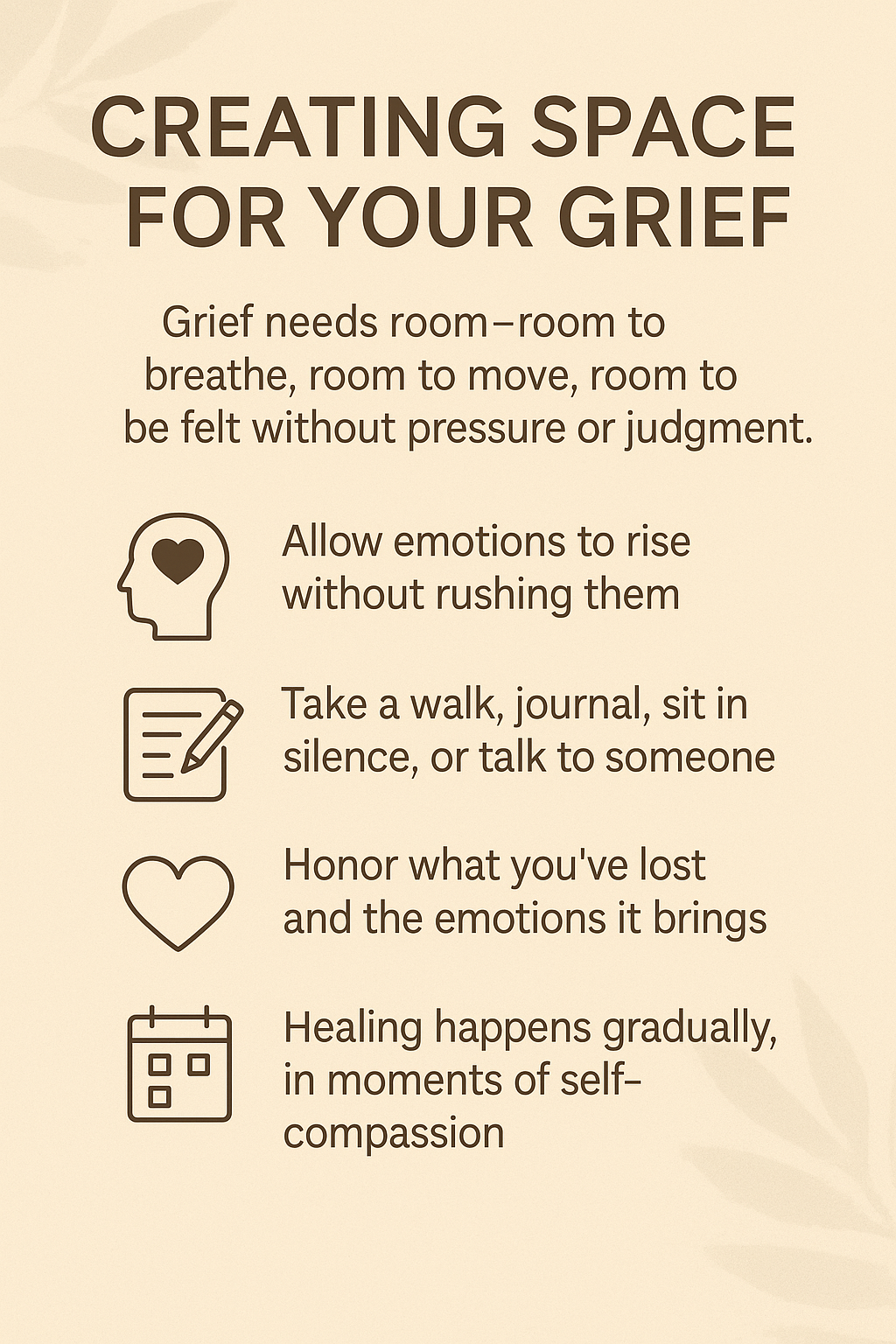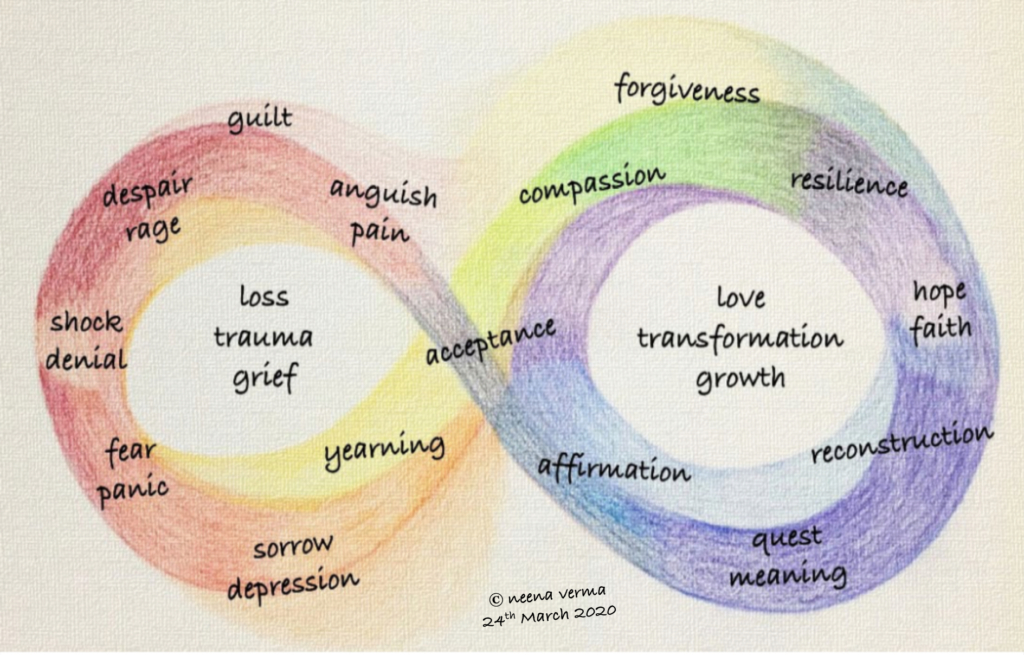Grief is a profoundly personal journey, and giving yourself real space to experience it can completely shift how you process and heal. So many people feel pressured to “move on,” stay busy, or pretend they’re okay, but pushing past grief too quickly often makes the pain linger beneath the surface. Creating space for your grief—whether that looks like quiet moments, reflection, journaling, or simply allowing yourself to feel—lays the groundwork for healthier emotional growth. It gives your mind and body the time they need to understand what you’ve lost and how life is changing. When you intentionally make room for your grief, you’re not dwelling on the past—you’re honoring your experience, supporting your emotional well-being, and allowing healing to unfold in its own time. Here’s why that space matters and how you can shape it in a way that fits your needs and your life.
Why Making Room for Grief Matters
I’ve learned that when we talk about grief, most people think about loss after death, but grief runs much deeper. Whether you’re dealing with the end of a relationship, losing a job, or another major life event, ignoring those feelings usually makes things more challenging in the long run. Allowing yourself to grieve isn’t just about being emotional. It’s about healing and keeping your emotional energy from getting stuck.
The American Psychological Association explains that unprocessed grief can show up as continued sadness, anxiety, or even physical symptoms like headaches and trouble sleeping (APA). Letting yourself grieve offers the chance to work through tough feelings, making it less likely they’ll surprise you later in life.
The Different Faces of Grief
Everyone experiences grief in their own way, and it doesn’t look the same for any two people. Sometimes it hits all at once, and other times it sneaks up and lingers for months or even years. I’ve seen grief show up as sadness, anger, guilt, or just numbness—the whole range is normal. Trying to rush it or pretend everything’s okay doesn’t really work.
Some typical ways grief can show up:
- Emotional waves: You might feel up and down, with good days mixed in with tough ones.
- Physical reactions: Trouble sleeping, changes in appetite, aches, or brain fog can all be signals.
- Behavioral changes: Wanting more alone time, overworking, or acting out can be ways to cope.
Starting to Make Space: Small Steps that Count
The first step in making space for grief is just admitting it’s there. That can feel awkward at first. I found that naming what I was feeling—even if it was just scribbling it down or telling a friend—helped lower the pressure. Setting up a ritual isn’t required; even a five-minute pause to check in with yourself goes a long way.
- Allow Your Feelings: Remind yourself that whatever you feel is valid. No emotion is “wrong” when it comes to grief.
- Find Your Way: Maybe you like journaling, or maybe art, music, or quiet reflection feels right. Try a few approaches to see what fits best.
- Slow Down: Don’t cram your schedule full. Taking breaks—even to step outside—lets you catch your breath.
- Talk About It: Connect with someone who listens without judging or “fixing” you. Sharing your story can help you better understand your emotions.
Common Challenges in Honoring Grief and How to Tackle Them
Modern life is packed with distractions, and it’s common to avoid facing grief. Add in the social pressure—family, friends, even workplaces might want you to “get back to normal.” Here’s what I’ve noticed helps most with these challenges:
- Social Expectations: If people around you seem uneasy about your grief, you don’t have to ease their discomfort. Give yourself permission to set boundaries and ask for more time or space.
- Feeling Stuck: Sometimes it feels like you’ll never move forward. Remember, grief isn’t a straight line; it comes and goes. If things feel heavy for a long while, talking to a therapist or joining a support group might give you new insight.
- Distractions and Busyness: Daily tasks and work can let you dodge your feelings. Scheduling short “grief breaks” helps you check in with yourself even on the busiest days.
Feeling Overwhelmed
Intense emotions can get overwhelming, especially when life’s other responsibilities pile up. When things feel too big, tackling small steps makes a difference. This could be breathing deeply, jotting a thought in a notebook, or looking at a comforting photo.
The Urge to “Move On” Too Quickly
We often hear messages about “bouncing back” fast, but there’s nothing wrong with taking your time. There’s no set timeline for grief. It’s okay to take it slow, even if others move on quickly.
Physical Signs of Grief
Grief doesn’t only hit your feelings. It often affects your body—fatigue, headaches, trouble focusing. Gentle routines like staying hydrated, spending a few minutes outdoors, or aiming for consistent sleep can make a real difference.
Practical Ways to Create Space for Grief in Daily Life
You don’t need huge blocks of time to make room for grief—it’s more about small acts of kindness towards yourself. Here are some helpful tips:
- Designate a Quiet Spot: This can be a favorite chair, a walk around the block, or even a parked car—anywhere you can sit for a few moments and breathe.
- Keep Reminders Close: A cherished photo, memento, or letter can help you thoughtfully honor your feelings.
- Try Creative Outlets: Drawing, writing, or simply playing music can help you get at what’s going on inside. Skill doesn’t matter—it’s about expressing yourself.
- Practice Mindfulness or Meditation: Just five minutes of present-focused breathing can ease stress and help you be more honest with yourself.
- Honor Important Days: Anniversaries and birthdays can stir up fresh grief. Plan small, meaningful gestures, like lighting a candle or sharing a memory, to honor those moments.
In addition, you might want to check out group activities or community events that allow people to share memories and reflect together. Attending a remembrance walk or helping organize a simple memorial art project can offer both comfort and a sense of connection with others dealing with similar emotions.
Real-Life Benefits of Giving Grief Breathing Room
Does making room for challenging emotions actually help? It definitely can. When I started letting myself feel what I needed to, my overall stress levels went down, my mood steadied, and I even noticed improvements at work. While this doesn’t make the pain vanish, it softens the experience over time.
Research backs this up. The Center for Complicated Grief at Columbia University notes that pushing away grief can cause depression, anxiety, and physical health concerns. Honest acknowledgement and self-compassion increase your chances of long-term healing (Columbia University Complicated Grief Program).
Frequently Asked Questions
People naturally have questions about how to make space for grief while keeping up with daily life. Here are a few common ones:
Question: How long should I expect to feel this way?
Answer: There’s no official timeline. Some people notice things easing up in weeks, while for others it can take much longer. All timeframes are okay.
Question: What if I feel numb instead of sad?
Answer: Numbness is a typical early response. Emotions might take their time to surface. Don’t force it—let things unfold naturally.
Question: Is it all right to find joy after a loss?
Answer: Absolutely. Enjoying a laugh or good moment doesn’t mean you’re not honoring your loss. Joy and grief can exist together.
Building a Grief-Friendly Life
Letting grief have its place doesn’t mean you shut down everything else in your life. It simply means you’ve given yourself the okay to feel, remember, and adapt. Over time, this openness helps you make new memories while still holding on to what’s important from your past. If you wonder what’s normal or get stuck, reaching out to a counselor or support group always helps. Swapping stories and tips with others who get it can lighten the load.
Learning to create space for grief isn’t about following a strict guide. It’s about stumbling upon what soothes and supports you through tough stretches. With patience, support, and genuine kindness for yourself, you can handle loss while still living your life—and discover new layers of strength along the way.
Video: The Secret to Healing After Loss

